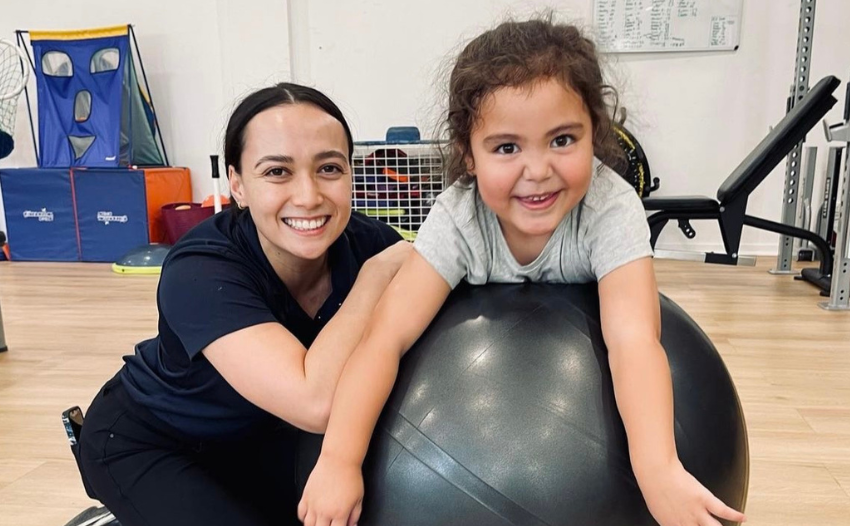
The importance of core strength for children with developmental Disabilities
Every child is unique, and when it comes to children with developmental disabilities, understanding and addressing their specific needs and limitations is essential. One often overlooked but essential aspect is the development of core strength. Core strength is an important building block in a child’s development and wellbeing, right from the moment we start crawling and exploring.
Research has shown that children with developmental disabilities (such as Autism Spectrum Disorder, Development Coordination Disorder, Global Developmental Delay) may experience low muscle tone through their core, resulting in gross and fine motor skill challenges, including limitations with balance and coordination.
What is our ‘core’?
Physiotherapists are often involved right from the initial management phase. Alongside your GP and other specialists involved, they help diagnose work related injuries, and assess the functional deficits related to the injury to guide the injury management process. Your physio will help you understand your injuries, and the recovery process, as well as help link you in with other health professionals who may be needed throughout your recovery journey including Exercise Physiologists, Occupational Therapists, Psychologists, and Specialists.
During the early stages of your recovery, your Physiotherapist can help you with pain management strategies to aid throughout your day, as well as provide some relieving manual therapy techniques during your appointment where appropriate. They use exercise prescription to help you regain your range of movement, strength and functional capacity while allowing the tissues to heal and recover. We work with you to address your needs and concerns with ultimate focus on a successful return to your full and unrestricted work duties.
Understanding what comprises the core and its role in your child’s body is essential. The core is more than just the abdominal muscles. It includes the lower back, hip, and pelvic floor muscles. This serves as the body’s stabiliser, supporting proper posture, balance, and several movements crucial for everyday activities – including the small ones such as handwriting!
Why is core strength important for my child?
Think of the core as the trunk of a tree – it needs to be able to hold the weight of its moving branches. Here are several reasons why core strength is ESSENTIAL in children, and particularly those with developmental disabilities or low muscle tone:
-
- Balance and stability: a strong core allows children to move confidently and maintain dynamic balance, reducing the risk of falls and injuries during play, sports or daily activities
- Improved focus: core strength is associated with better postural control and endurance, which can positively impact a child’s ability to concentrate and focus on tasks, including academic activities, contributing to better learning experiences
- Improved gross and fine motor skills: Strong core muscles have been linked to the acquisition of gross and fine motor skills, helping children achieve basic tasks such as sitting, standing and reaching. It supports movement through large gross motor activities and fine motor activities (e.g. handwriting, tool manipulation) by maintaining an upright posture
- Increased independence in daily activities: a strong core enhances overall body coordination, making it easier for individuals to achieve independence
- Improved cognitive function: research suggests a strong correlation between physical activity (including core-strengthening exercises) and improved cognitive function.
(Salar et al., 2014) (Burnett et al., 2011) (K Au et al., 2014)
What are some things I can do at home to help my child’s core strength?
There are many simple and fun activities you can do with your child at home to help build their core strength! Some include:
- Animal walks: such as bears, crabs, frogs, or bunnies
- Wheelbarrow walking races
- Pretending to be Superman on the ground
- Sitting and rocking on an exercise ball
- Climbing or monkey bars
- Navigating obstacle courses (using pillows, chairs etc.)
How can Body Smart Health help?
At Body Smart Health, we have a multi-disciplinary team of Physiotherapists, Exercise Physiologists and Occupational Therapists who can work together to assess limitations and provide a holistic approach to help your child with their developmental milestones.
Our physical therapists can utilise movement and exercise to focus on developing your child’s core through engaging and play-based activities.
References:
Au MK, Chan WM, Lee L, Chen TM, Chau RM, Pang MY. Core stability exercise is as effective as task-oriented motor training in improving motor proficiency in children with developmental coordination disorder: a randomized controlled pilot study. Clinical Rehabilitation. 2014;28(10):992-1003. doi:10.1177/0269215514527596
Burnett, Rachel; Cornett, Nicole; Rekart, Gina; Donahoe-Fillmore, Betsy; Brahler, C. Jayne; Aebker, Susan; and Kreill, Megan, “Investigating the Associations between Core Strength, Postural Control and Fine Motor Performance in Children” (2011). Physical Therapy Faculty Publications. 46. https://ecommons.udayton.edu/dpt_fac_pub/46
Salar S, Daneshmandi H, Karimizadeh Ardakani M, Nazari Sharif H. The Relationship of Core Strength with Static and Dynamic Balance in Children with Autism. Ann Appl Sport Sci 2014; 2 (4) :33-42 URL: http://aassjournal.com/article-1-190-en.html
About the Author:

Chloe Fitzgerald is an accredited Exercise Physiologist and is based out of our Beenleigh clinic.
If you would like to make an initial appointment with any of our available Physiotherapists or Exercise Physiologists, you can contact us on 1300 630 204 or email reception@bodysmarthealth.com.au